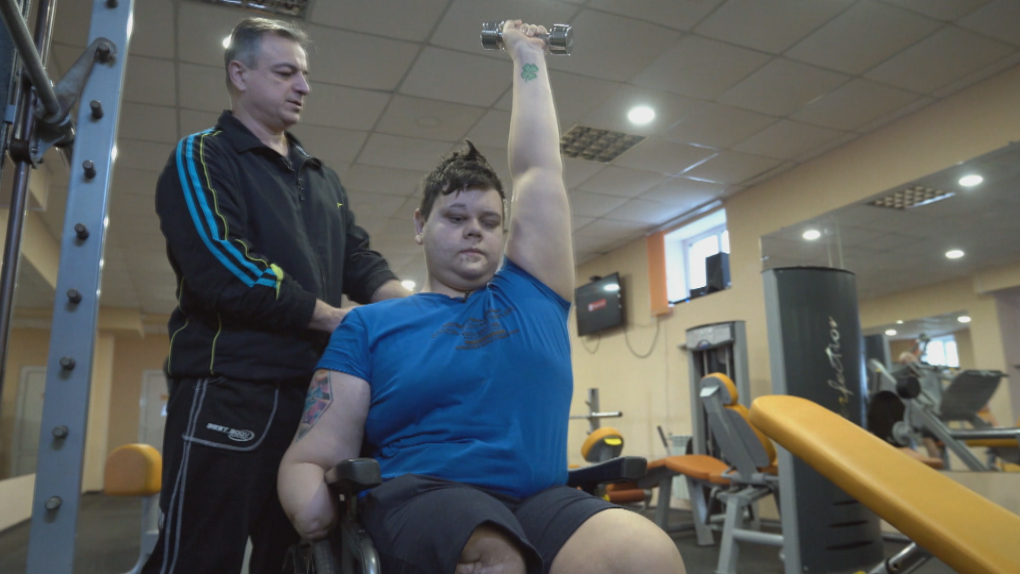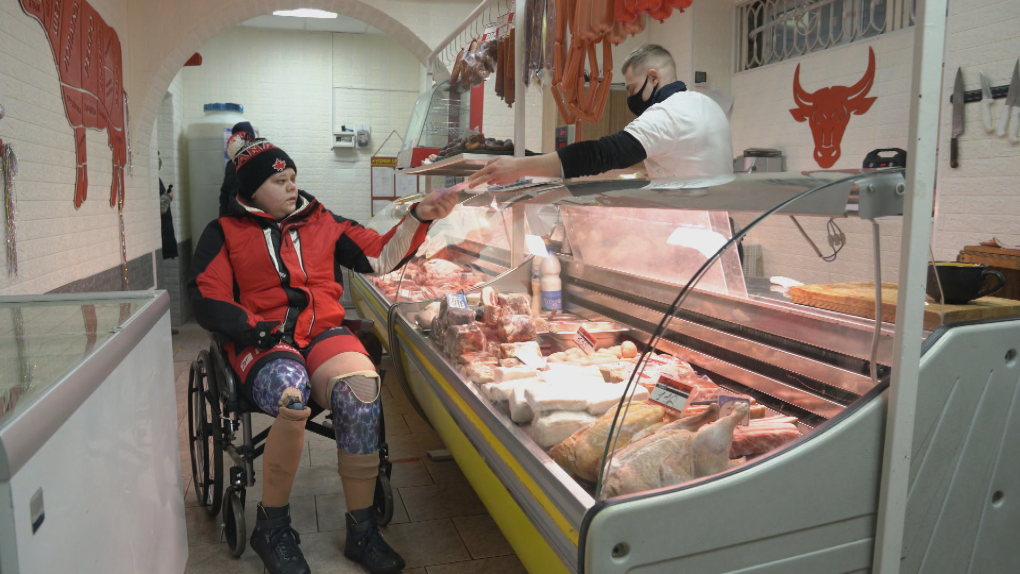As conflict reignites, a Ukrainian family knows all too well 'the collateral damage of war'
This story contains details some readers may find disturbing.
These are fearful times for many Ukrainians, none more so than Alla Nzynhykovska.
The sound of shelling from pro-Russian forces has kept her and her family up through the night as their hometown of Mariupol, just 50 kilometres from the Russian border, has been an early target of attack.
“It is very close and that makes life a little bit scary,” she tells W5.
Nzynhykovska knows better than most the horrific toll military conflict can have even on civilians not directly engaged in battle. She learned that terrible lesson on Aug. 24, 2015. At that time, Russia in and Ukrainian forces were once again at odds and a Ukrainian military training base was near their then home in the village of Volodarske.
”There was ammunition all around,” says Nzynhykovska.
Her two young sons, Mykola, 11, and Danyo, 4, were part of a group of kids roaming the neighbourhood. Mykola came across an undetonated grenade and went to show it to his friends. Some playful jostling ensued and he stepped on it. The grenade went off.
Danyo was killed instantly. Miraculously, Mykola survived, but he was unrecognizable. His body was filled with shrapnel and torn apart.
The ensuing months were filled with little but grief and pain for Mykola. He underwent a series of surgeries and other medical procedures. The blast had left him a triple amputee -- losing his limbs, only his left arm remained intact.
In October 2015, Mykola, with Nzynhykovska at his side, arrived by ambulance at the 250-year-old military hospital in the heart of Kyiv. More doctors, more drugs and more procedures would ensue, but this would mark a turning point in his recovery.
A Canadian medical team was on hand, taking part in a mission to treat Ukrainian soldiers, and that team was determined to help Mykola.
“I remember taking care of him and meeting him for the first time in the examining chair. And it was quite the sight to behold,” remembers Winnipeg anesthesiologist Adrian Hawaleska. “Pure evidence of the collateral damage of war. All right there in front of you in a little boy.”
Doctors removed shrapnel from his face and repaired the hole in his skull.
“I think it was just fortuitous we were there. We were there in the right place and the right time and we could do something about it,” says Dr. Hawaleshka.
They weren’t, however, equipped for the more extensive surgery he needed on his limbs. That job would fall to doctors in Montreal.
Word of Mykola’s plight quickly spread to Canada. The Canada-Ukraine Foundation and the Shriners Hospital for Children in Montreal joined forces and arranged to fly Mykola and Nzynhykovska to Canada, where he would receive a year of treatment and rehabilitation.
 The Canada-Ukraine Foundation and the Shriners Hospital for Children in Montreal joined forces and arranged to fly Mykola and Nzynhykovska to Canada, where he would receive a year of treatment and rehabilitation (W5)In the wake of yet another surgery, he was fitted with prosthetic legs and undertook the grueling task of learning to walk again.
The Canada-Ukraine Foundation and the Shriners Hospital for Children in Montreal joined forces and arranged to fly Mykola and Nzynhykovska to Canada, where he would receive a year of treatment and rehabilitation (W5)In the wake of yet another surgery, he was fitted with prosthetic legs and undertook the grueling task of learning to walk again.
“The Canadian prosthetics were magnificent,'' recalls Mykola. “I remember the first time I was able to walk on my prosthetics. It felt like my legs had reappeared.’’
In 2017, the family returned to Ukraine where Mykola has garnered attention for his exploits as a swimmer. In 2019, he swam 500 metres across Kyiv’s Dnipro River faster than any amputee previously, putting his name into local record books.
For a while, he aspired to compete for Ukraine in the Paralympics, but the pandemic has put those dreams on hold. Most pools in Ukraine have been shut down, so these days he stays active by working out twice a week.
He long ago outgrew his Canadian prosthetics and the replacements simply don’t fit as well, so he usually relies on his wheelchair to get around, even though much of Mariupol isn’t wheelchair accessible.
 Mykola long ago outgrew his Canadian prosthetics so he usually relies on his wheelchair to get around (W5)“There are places you can’t access with a wheelchair at all," says Nzynhykovska. “In Ukraine it’s very difficult to be a disabled person. Many disabled people just simply stay at home. They don’t go out. They don’t leave their homes.”
Mykola long ago outgrew his Canadian prosthetics so he usually relies on his wheelchair to get around (W5)“There are places you can’t access with a wheelchair at all," says Nzynhykovska. “In Ukraine it’s very difficult to be a disabled person. Many disabled people just simply stay at home. They don’t go out. They don’t leave their homes.”
However, Mykola isn’t the type to simply sit at home. While the rest of his country may be looking to the future with fear and dread, he remains undaunted.
“In the spring I will turn 18, and new opportunities will open up. You need to find a job. Earn money and take care of your own needs. Get a car and all that. I’m going to continue my schooling and learn how to cook.”
It’s that kind of resilience that continues to inspire Dr. Hawaleshka.
“By any stretch of the imagination he has affected my life more than I have affected his. I remember him and will remember him forever. What an incredible young man.”
CTVNews.ca Top Stories

International students will be allowed to work 24 hours a week starting in September
Immigration Minister Marc Miller says international students will be able to work off-campus for up to 24 hours per week starting in September.
Toronto police arrest 12 people, lay 102 charges in major credit card fraud scheme
Toronto police say 12 people are facing a combined 102 charges in connection with an investigation into a major credit fraud scheme.
MPs targeted by Chinese hackers question why Canada didn't tell them
Members of Parliament are questioning why Canadian security officials did not inform them that they had been the target of Beijing-linked hackers, after learning from the FBI that the international parliamentary alliance they are a part of was in the crosshairs of the Chinese cyberattack in 2021.
Norovirus spreading at 'higher frequency' than expected in Canada
Norovirus is spreading at a 'higher frequency' than expected in Canada, specifically, in Ontario and Alberta, according to the Public Health Agency of Canada.
B.C. premier says Vancouver speech praising Hamas attack was 'most hateful' he can imagine
B.C. Premier David Eby has joined other politicians denouncing remarks at a demonstration in Vancouver where protesters chanted “long live Oct. 7,” praising that day's attacks by Hamas on Israel.
Less alcohol, or none at all, is one path to better health
Moderate drinking was once thought to have benefits for the heart, but better research methods have thrown cold water on that.
In a world first, king-size cigarettes in Canada must feature one of these warnings starting Tuesday
Tobacco manufacturers have until Tuesday to ensure every king-size cigarette produced for sale in Canada has a health warning printed directly on it.
WATCH So you haven't filed your taxes yet…
The clock is ticking ahead of the deadline to file a 2023 income tax return. A personal finance expert explains why you should get them done -- even if you owe more than you can pay.
Anne Hathaway reveals she's now five years sober
Anne Hathaway first shared she lost interest in drinking after a bad hangover in 2018. She’s now five years sober.
Local Spotlight

Canada's oldest hat store still going strong after 90 years
Since 1932, Montreal's Henri Henri has been filled to the brim with every possible kind of hat, from newsboy caps to feathered fedoras.
Road closed in Oak Bay, B.C., so elephant seal can cross
Police in Oak Bay, B.C., had to close a stretch of road Sunday to help an elephant seal named Emerson get safely back into the water.
B.C. breweries take home awards at World Beer Cup
Out of more than 9,000 entries from over 2,000 breweries in 50 countries, a handful of B.C. brews landed on the podium at the World Beer Cup this week.
Kitchener family says their 10-year-old needs life-saving drug that cost $600,000
Raneem, 10, lives with a neurological condition and liver disease and needs Cholbam, a medication, for a longer and healthier life.
Haida Elder suing Catholic Church and priest, hopes for 'healing and reconciliation'
The lawyer for a residential school survivor leading a proposed class-action defamation lawsuit against the Catholic Church over residential schools says the court action is a last resort.
'It was instant karma': Viral video captures failed theft attempt in Nanaimo, B.C.
Mounties in Nanaimo, B.C., say two late-night revellers are lucky their allegedly drunken antics weren't reported to police after security cameras captured the men trying to steal a heavy sign from a downtown business.
Fergus, Ont. man feels nickel-and-dimed for $0.05 property tax bill
A property tax bill is perplexing a small townhouse community in Fergus, Ont.
Twins from Toronto were Canada's top two female finishers at this year's Boston Marathon
When identical twin sisters Kim and Michelle Krezonoski were invited to compete against some of the world’s most elite female runners at last week’s Boston Marathon, they were in disbelief.
Mystery surrounds giant custom Canucks jerseys worn by Lions Gate Bridge statues
The giant stone statues guarding the Lions Gate Bridge have been dressed in custom Vancouver Canucks jerseys as the NHL playoffs get underway.















































